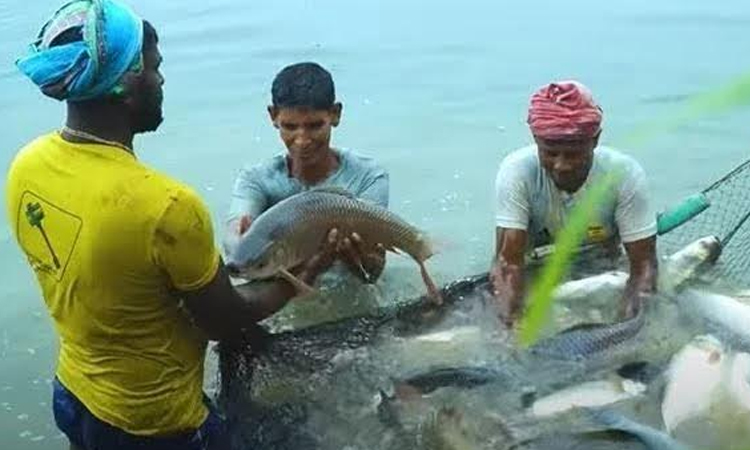News Flash

By Md Aynal Haque
RAJSHAHI, July 15, 2025 (BSS)- Commercial fish farming has significantly contributed to improving the financial stability and social standing of many individuals in the region, particularly due to the successful implementation of composite fish farming, where multiple species are raised together, leading to higher yields.
According to sources concerned, fish farming is flourishing in the region, with many individuals becoming self-reliant through this profitable venture. The expansion of fish farming, predominantly in the Barind tract, has resulted in a substantial increase in fish production. Rajshahi has emerged as a key supplier of live fish to various parts of the country, including the capital Dhaka.
Muhammad Badiuzzaman, a successful fish farmer from Keshorehat village under Mohanpur Upazila, produced 45.25 tonnes of fish worth around Taka 56.50 lakh in 2024, earning a net profit of approximately Taka 20 lakh.
He said several new ponds have been dug for commercial fish cultivation in Mohanpur, further boosting production in the area.
Hossain, another local fish farmer, said fish farming in Mohanpur Upazila has seen significant success in recent years, contributing to meeting local demand as well as supplying fish to other regions.
The Department of Fisheries (DoF) has played a pivotal role in this success through various development initiatives, including training programs and the promotion of composite fish farming practices.
Many other farmers, including Amzad Hossain, have also achieved substantial profits from their ventures in fish farming, highlighting the sector's potential. The practice has improved the financial well-being of many, while also enhancing their social dignity and contributing to regional nutrition security through increased availability of animal protein.
The success story of Sadiqul Islam, a commercial fish farmer from Paba Upazila, underscores the sector's potential. Starting with a small pond in 2012, he now manages fish farming across over 180 bighas of land.
"Fish farming is a profitable business, and live fish trading is even more lucrative," said Ershad Ali, 47, a fish farmer from Shilmaria village under Puthia Upazila.
"Many landowners are now digging new ponds to lease out to fish farmers. The current lease value for one bigha of pond ranges between Taka 30,000 and Taka 40,000," Ershad stated.
He also said that with a budget of around Taka 1.5 lakh to Taka 2 lakh, anyone can start fish farming using modern methods.
District Fisheries Officer Jahangir Alam said that fish production in Rajshahi has doubled in recent years, with a sharp rise in the number of fish farming ponds.
He said many unemployed youths have turned to fish farming as a viable livelihood, becoming self-reliant and contributing to the region's economy.
Rajshahi has now become a fish-surplus district and earns a substantial amount of revenue by supplying fish to other districts regularly. Both closed and open water bodies have contributed to the surge in fish production, and the number of ponds and canals dedicated to fish farming continues to grow.
Jahangir Alam also mentioned that Rajshahi and surrounding districts have long been pioneers in supplying live fish to different parts of the country, including Dhaka.
Currently, there are numerous ponds on 13,050 hectares of land in the district, producing around 84,000 tonnes of fish annually, ensuring food security in terms of animal protein and generating employment for approximately 288,000 people.
Saifuddin Yeahia, Divisional Director of the Department of Fisheries, said the region has attained remarkable success in composite fish farming. He noted that the region has also achieved surplus production of fish spawn and fingerlings.
"In the last fiscal year, fish farmers harvested 476,000 tonnes of fish from 403,000 hectares of different categories of water-bodies, against a demand of 404,000 tonnes for around 1.92 crore people in the division," he said.
Yeahia attributed this success to the implementation of multidimensional development and extension programs, including the promotion of modern technologies.
To further boost fish production in internal water bodies, approximately 104,000 lakh tonnes of fish fingerlings have been stocked at a cost of around Taka 15.62 crore, benefiting 6.84 lakh fish farmers.
Additionally, a beel nursery covering 1,370.06 hectares of water-bodies has been established at a cost of around Taka 2.8 crore, benefiting 58,984 fish-growers and contributing significantly to the production of carp fish.
Fish farming is making many people financially solvent, raising their social status, and helping meet the demand for animal protein both in the region and across the country.